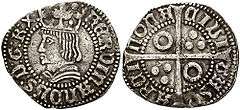Ferdinand II of Naples
| Ferdinand II | |
|---|---|
|
Medal of Ferdinand as Duke of Calabria by Adriano Fiorentino | |
| King of Naples | |
| Reign | 23 January 1495 – 7 September 1496 |
| Predecessor | Alfonso II |
| Successor | Frederick |
| Born |
26 August 1469 Naples |
| Died |
7 September 1496 (aged 27) Somma Vesuviana |
| Burial | San Domenico Maggiore |
| Spouse | Joanna of Naples |
| House | House of Trastámara |
| Father | Alfonso II of Naples |
| Mother | Ippolita Maria Sforza |
| Religion | Roman Catholicism |
Ferdinand II (Italian: Ferdinando/Ferrante; 26 August 1469 – 7 September 1496) was King of Naples from 1495 to 1496. He was the son and successor of Alphonso II, and heir of the Brienne claim to kingdom of Jerusalem.
Biography
Alphonso, finding his tenure of the throne uncertain on account of the approaching invasion of Charles VIII of France and the general dissatisfaction of his subjects, abdicated in Ferdinand's favour on 23 January 1495.
The 24-year-old new king tried to resist, but the French troops had already occupied much of the northern territories of the Kingdom. The Neapolitan troops on the Liri and Garigliano rivers were obliged to retreat when the fortesses of Capua and Gaeta fell. The treason of a party in Naples rendered it impossible to defend the city against the approach of Charles VIII, who entered Naples on 20 February 1495. In the capital, only Castel dell'Ovo resisted, defended by Alfonso d'Avalos.
Ferdinand fled to the castle at Ischia with an escort of 14 galleys, together with the royal family, the general Innico d'Avalos and the poet Jacopo Sannazaro. The commander of the island fortress had already made an agreement with the French, and opposed the King Ferdinand's entrance. When the two met, Ferdinand killed the commander personally, and had his body thrown into the sea. Ferdinand later moved to Messina, where he joined his cousin Ferdinand II, king of Sicily and Spain.
In the meantime, Pope Alexander VI, (Rodrigo Borgia of Aragon before his election as pope) formed a coalition against Charles, made up of Emperor Maximilian, Venice, Milan and Spain. When the French king left Naples with most of his army, Ferdinand disembarked at Seminara in Calabria, forcing his way north to Naples. Blocked by French garrisons at Palmi, he decided to return to Naples by sea, and was again at Ischia (which had victoriously pushed back the French attacks) on 7 July 1496. The same day he was again in Naples: the citizens, irritated by the terrible conduct of their French conquerors during the occupation of the city, received him back with enthusiasm.

With the aid of the great Spanish general Gonzalo Fernández de Córdoba, Ferdinand was able to rid his state completely of its invaders shortly before his death.
In August 1496, with the kingdom firmly back in his hands, Naples was able to celebrate Ferdinand's wedding to his half-aunt Joanna. Joanna was the daughter of Ferdinand's grandfather Ferdinand I and his second wife, Joanna of Aragon. Joanna, born in 1478, a late child of Ferdinand I's second marriage, she was actually younger than Ferdinand. At the time of marriage, Ferdinand was 27 years old and Joanna 18.
After the wedding the royal couple decided to leave Naples and moved to Somma-Vesuvius. Here the king was struck with an illness and died within a few days. Ferdinand II died on 7 September 1496, a little over a year after his accession.
In the absence of direct heirs of the deceased king, the crown was inherited by his uncle Frederick, legitimate brother of his father, Alfonso II.
Ancestry
| Ancestors of Ferdinand II of Naples | |||||||||||||||||||||||||||||||||||||||||||||||||||||||||||||||||||||||||||||||||||||||||||||||||||||||||||||||||||||||||||||||||||||||||||||||||||||||||||||||||||||||||||||||||||||||||||||||||||||||||||||||||||||||||||||||||||||||||||||||||||||||||||||||||||||||||||||||||||||||||||||||||||||||||||||||||||||||||||||||||||||||||||||||||||||||||||||||||||||||||||||||||||||||||||||||||||||||||||||||||||||||||||||||||||||||||||||||||||||||||||||||||||||||||||
|---|---|---|---|---|---|---|---|---|---|---|---|---|---|---|---|---|---|---|---|---|---|---|---|---|---|---|---|---|---|---|---|---|---|---|---|---|---|---|---|---|---|---|---|---|---|---|---|---|---|---|---|---|---|---|---|---|---|---|---|---|---|---|---|---|---|---|---|---|---|---|---|---|---|---|---|---|---|---|---|---|---|---|---|---|---|---|---|---|---|---|---|---|---|---|---|---|---|---|---|---|---|---|---|---|---|---|---|---|---|---|---|---|---|---|---|---|---|---|---|---|---|---|---|---|---|---|---|---|---|---|---|---|---|---|---|---|---|---|---|---|---|---|---|---|---|---|---|---|---|---|---|---|---|---|---|---|---|---|---|---|---|---|---|---|---|---|---|---|---|---|---|---|---|---|---|---|---|---|---|---|---|---|---|---|---|---|---|---|---|---|---|---|---|---|---|---|---|---|---|---|---|---|---|---|---|---|---|---|---|---|---|---|---|---|---|---|---|---|---|---|---|---|---|---|---|---|---|---|---|---|---|---|---|---|---|---|---|---|---|---|---|---|---|---|---|---|---|---|---|---|---|---|---|---|---|---|---|---|---|---|---|---|---|---|---|---|---|---|---|---|---|---|---|---|---|---|---|---|---|---|---|---|---|---|---|---|---|---|---|---|---|---|---|---|---|---|---|---|---|---|---|---|---|---|---|---|---|---|---|---|---|---|---|---|---|---|---|---|---|---|---|---|---|---|---|---|---|---|---|---|---|---|---|---|---|---|---|---|---|---|---|---|---|---|---|---|---|---|---|---|---|---|---|---|---|---|---|---|---|---|---|---|---|---|---|---|---|---|---|---|---|---|---|---|---|---|---|---|---|---|---|---|---|---|---|---|---|---|---|---|---|---|---|---|---|---|---|---|---|---|---|---|---|---|---|---|---|---|---|---|---|---|---|---|---|---|---|---|---|---|---|---|---|---|---|---|---|---|---|---|---|---|---|---|---|---|---|---|---|---|---|---|---|---|---|---|---|---|---|---|---|---|---|---|---|---|---|---|---|
| |||||||||||||||||||||||||||||||||||||||||||||||||||||||||||||||||||||||||||||||||||||||||||||||||||||||||||||||||||||||||||||||||||||||||||||||||||||||||||||||||||||||||||||||||||||||||||||||||||||||||||||||||||||||||||||||||||||||||||||||||||||||||||||||||||||||||||||||||||||||||||||||||||||||||||||||||||||||||||||||||||||||||||||||||||||||||||||||||||||||||||||||||||||||||||||||||||||||||||||||||||||||||||||||||||||||||||||||||||||||||||||||||||||||||||
See also
References
 This article incorporates text from a publication now in the public domain: Chisholm, Hugh, ed. (1911). "article name needed". Encyclopædia Britannica (11th ed.). Cambridge University Press.
This article incorporates text from a publication now in the public domain: Chisholm, Hugh, ed. (1911). "article name needed". Encyclopædia Britannica (11th ed.). Cambridge University Press.
External links
| Ferdinand II of Naples Born: 26 August 1469 Died: 7 September 1496 | ||
| Regnal titles | ||
|---|---|---|
| Preceded by Alfonso II |
King of Naples 1495–1496 |
Succeeded by Frederick |